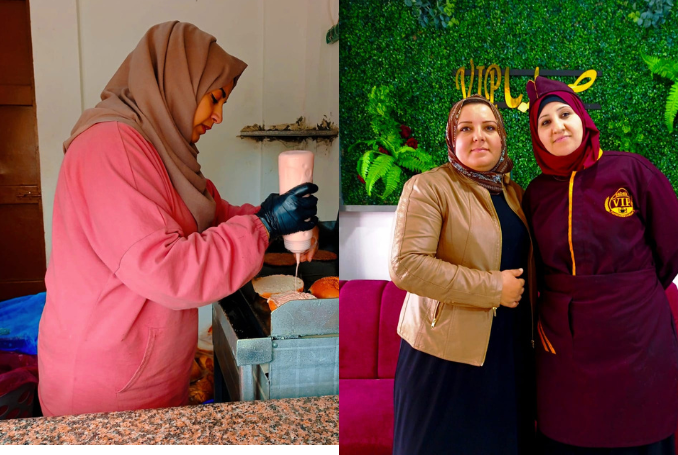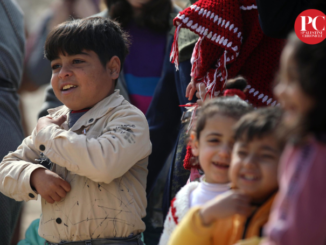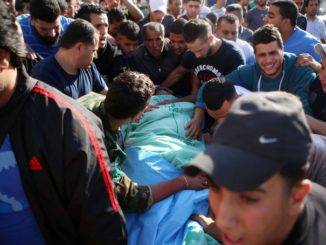
Every morning, Amani Shaat starts her day at 9 am by shopping for all the ingredients she needs for the day. Then she heads to her little street kiosk to cook beef burgers for customers who keep her busy till almost midnight.
Amani, 25, is the first woman in Gaza to work in a street kiosk. After she started her business, named ‘Saltaa Burger’, in January, she was soon noticed by journalists and curious customers.
“They were astonished to see a girl standing and cooking in a kiosk on the street. The number of burger patties that I prepared for two days finished after two hours,” she recalled happily.
Amani’s route to her little kiosk overlooking the sea on Al-Rasheed street has taken a number of twists and turns. She started out working in a wedding dress shop where the pay was poor. Four years ago, Amani and her husband traveled to Turkiye looking for work.
First, Amani worked in several factories, before working as a waiter and a cook in different restaurants where they offered western dishes. This is how she learned the recipe for the beef burger.
While she prepared a burger meal for a customer in Gaza, Amani told me: “My life was stable enough in Turkiye. I wasn’t planning to come back to Gaza. But my mother is very sick and I wanted to be with her. Her treatment will last for a long time so I started to think of what I could do for a living while staying close to her.”
It was a dream of hers to run her own fast-food business but the question was, where could she do it? She thought of starting up in a retail store in the university district but there were two big problems: the rent was expensive and she had no money at all. And most of her customers would be university students who would not have much money either to spend on her burgers.
The situation looked hopeless until one day, when she was walking on Al-Rasheed street, she spotted a kiosk that was closed and abandoned. She managed to locate the owner, Mahmoud Al-Muhtadi, who was running another kiosk next door. “I told him I want to rent this abandoned kiosk. He told me he used it for storage,” recalled Amani.
“Then he said: ‘You are a girl. What would a girl do in a kiosk?’ I told him the idea and he was impressed and said:‘I will give you the kiosk and I will be your business partner.’”
Not everyone in Amani’s life believed in her and many people tried to discourage her from pursuing her fast food dream. “People surrounding me told me I would fail in this as I failed in everything else I did before. So I was worried that all my efforts would be in vain because I wouldn’t be able to do it alone without support, especially as I didn’t have enough capital.”
But Amani was determined to give it a try as she knew she had two things on her side, one, in Gaza, beef burgers are only offered in restaurants where they are relatively expensive, and two, she would prepare the burger patty herself according to her own recipe.
Amani sells a burger without chips for 7 NIS (approx 2$) and a burger with chips for 10 NIS (approx 3$).
Amani cannot contain her excitement about how successful her small business has become. “I was stressed out when the first customer came on opening day,” she recalled with a smile. “I work all day. I am exhausted; but when a customer tells me, ‘It is delicious,’ I forget all the tiredness and I feel as if I were over the moon.
“I don’t know what the next step is. I don’t even have time to think about it. All that matters is that I am achieving what I have always dreamed of.”
Sabaia: A Woman’s Place
When the coronavirus spread throughout Gaza, Riham Hamouda, 37, lost various part-time jobs she had held for years. But she also had time to think. She concluded that a starting point would be a business that is run entirely by women and caters entirely to women.
So, she started a restaurant where all the staff and all the customers were women. With initial capital provided by her supportive husband, Riham launched ‘Sabaia VIP’, in August of last year.
Sabaia is an Arabic word meaning “girls”.
“I meant to do it for women only because a Palestinian woman suffers more than anyone on earth. She suffers from the Israeli wars and siege, the male-dominated society she lives in,” said Riham. “I wanted to reward women by offering them a place where they can feel comfortable, study, sing, dance, wear comfortable clothes and uncover their hair – a place where they can be completely free.”
Sabaia VIP was popular from the very start with women throughout Gaza. The space Riham created for them was so unique and badly needed.
“Many women have told me that a similar idea was in their head but they didn’t have the courage to make it a reality. Indeed, I am still surprised that I took this bold step,” she said.
The restaurant offers mostly a mix of western and eastern food, focusing mostly on healthy meals and desserts. Some brides even have their henna party (the traditional pre-wedding hand painting) at Riham’s restaurant.
Sabaia VIP is the first restaurant in Gaza whose main chef is also a woman. Sabrine al-Silawi, 42, has loved cooking since childhood, as she watched her month cook using the traditional Palestinian mud oven. With a diploma in arts and crafts, Sabrine likes to decorate food with attractive displays.
Before joining Sabaia VIP, Sabrine also worked as a chef assistant in various restaurants. But everywhere she went, the staff were all men except for her. “It was embarrassing for me and the atmosphere was always uncomfortable. I felt chained,” she said.
Now Sabrine feels free and says there is a contrast between the way men and women work in the kitchen. “There is a big difference, for example, women are more precise and organized.”
For Riham, starting Sabaia VIP was a big, but worthy risk which seems to be paying off.
“Some doubted that my business would succeed. But the customers keep growing and keep coming back .. ” she said with a happy smile.

Lubna Abuhashem is a freelance writer and translator from Gaza. We Are Not Numbers contributed this article to The Palestine Chronicle.







